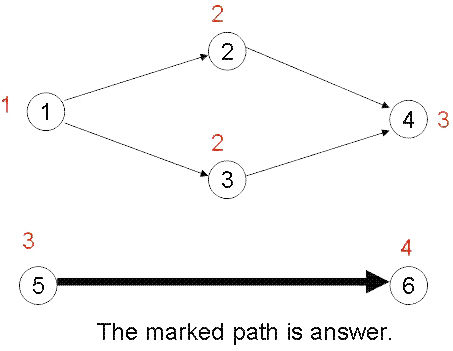Description
Mr.Dog was fired by his company. In order to support his family, he must find a new job as soon as possible. Nowadays, It's hard to have a job, since there are swelling numbers of the unemployed. So some companies often use hard tests for their recruitment.
The test is like this: starting from a source-city, you may pass through some directed roads to reach another city. Each time you reach a city, you can earn some profit or pay some fee, Let this process continue until you reach a target-city. The boss will compute the expense you spent for your trip and the profit you have just obtained. Finally, he will decide whether you can be hired.
In order to get the job, Mr.Dog managed to obtain the knowledge of the net profit Vi of all cities he may reach (a negative Vi indicates that money is spent rather than gained) and the connection between cities. A city with no roads leading to it is a source-city and a city with no roads leading to other cities is a target-city. The mission of Mr.Dog is to start from a source-city and choose a route leading to a target-city through which he can get the maximum profit.
Input
The first line of each test case contains 2 integers n and m(1 ≤ n ≤ 100000, 0 ≤ m ≤ 1000000) indicating the number of cities and roads.
The next n lines each contain a single integer. The ith line describes the net profit of the city i, Vi (0 ≤ |Vi| ≤ 20000)
The next m lines each contain two integers x, y indicating that there is a road leads from city x to city y. It is guaranteed that each road appears exactly once, and there is no way to return to a previous city.
Output
Sample Input
6 5 1 2 2 3 3 4 1 2 1 3 2 4 3 4 5 6
Sample Output
7
Hint


1 #include "iostream" 2 3 #include "cstdio" 4 5 #include "cstring" 6 7 #include "algorithm" 8 9 #include "queue" 10 11 #include "stack" 12 13 #include "cmath" 14 15 #include "utility" 16 17 #include "map" 18 19 #include "set" 20 21 #include "vector" 22 23 #include "list" 24 25 #include "string" 26 27 using namespace std; 28 29 typedef long long ll; 30 31 const int MOD = 1e9 + 7; 32 33 const int INF = 0x3f3f3f3f; 34 35 const int MAXN = 1e5 + 5; 36 37 int n, m, num; 38 39 int cost[MAXN], in[MAXN], out[MAXN], head[MAXN], dp[MAXN]; 40 41 bool vis[MAXN]; 42 43 struct node 44 45 { 46 47 /* data */ 48 49 int fr, to, nxt; 50 51 }e[MAXN * 10]; 52 53 void add(int x, int y) 54 55 { 56 57 e[num].fr = x; 58 59 e[num].to = y; 60 61 e[num].nxt = head[x]; 62 63 head[x] = num++; 64 65 } 66 67 void toposort() 68 69 { 70 71 int cnt = 1; 72 73 while(cnt < n) { 74 75 for(int i = 1; i <= n; ++i) 76 77 if(in[i] == 0 && !vis[i]) { 78 79 vis[i] = true; 80 81 cnt++; 82 83 for(int j = head[i]; j != -1; j = e[j].nxt) { 84 85 int x = e[j].to; 86 87 in[x]--; 88 89 if(dp[i] + cost[x] > dp[x]) dp[x] = dp[i] + cost[x]; 90 91 } 92 93 } 94 95 } 96 97 } 98 99 int main(int argc, char const *argv[]) 100 101 { 102 103 while(scanf("%d%d", &n, &m) != EOF) { 104 105 memset(in, 0, sizeof(in)); 106 107 memset(out, 0, sizeof(out)); 108 109 memset(head, -1, sizeof(head)); 110 111 memset(vis, false, sizeof(vis)); 112 113 num = 1; 114 115 for(int i = 1; i <= n; ++i) 116 117 scanf("%d", &cost[i]); 118 119 for(int i = 1; i <= m; ++i) { 120 121 int x, y; 122 123 scanf("%d%d", &x, &y); 124 125 add(x, y); 126 127 in[y]++; 128 129 out[x]++; 130 131 } 132 133 for(int i = 1; i <= n; ++i) 134 135 if(in[i] == 0) dp[i] = cost[i]; 136 137 else dp[i] = -INF; 138 139 toposort(); 140 141 int ans = -INF; 142 143 for(int i = 1; i <= n; ++i) 144 145 if(out[i] == 0 && dp[i] > ans) ans = dp[i]; 146 147 printf("%d ", ans); 148 149 } 150 151 return 0; 152 153 }
代码转自(https://blog.csdn.net/gkhack/article/details/50223357)
